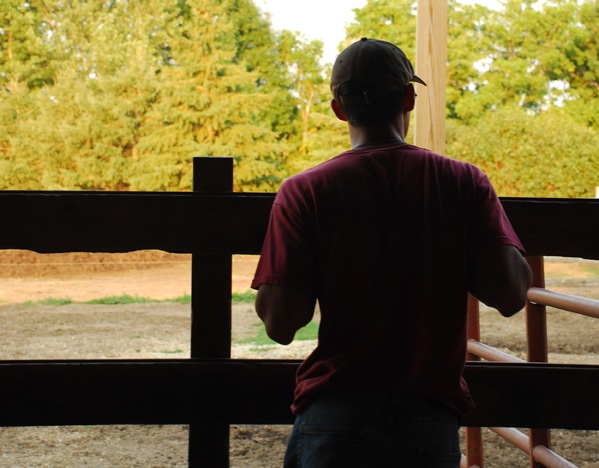Is Ranch Life A Form Of Child Abuse? This Farm Girl Responds.
July 28, 2014

A few weeks ago, I sat in the doctor��’s office with my 6-week-old daughter, Scarlett, and watched as her pediatrician walked her through the various tests to check her development during her well-baby appointment. Admittedly, I was a little nervous for this appointment, but I had good reason -- she was going to get three routine shots that day, and this first-time mama wasn’t quite sure how her little princess would take it.
When her doctor noticed my admittedly very protective, watchful eye as she held my baby, she reminded me that I couldn’t treat Scarlett like a delicate flower her whole life.
“You’ll have to toughen her up, Amanda,” she advised me. “Let Dad rough-house with her. Let her get into scrapes. She can’t be a princess forever.”
Then, I reminded her that Scarlett was going to grow up to be a tough farm girl, and I highly doubted she would be treated like a porcelain doll for too long.
“Oh, well that changes everything,” the doctor said.
Subscribe now to Cow-Calf Weekly to get the latest industry research and information in your inbox every Friday!
You bet it does! Growing up as a farm kid myself, it didn’t matter that I was a girl when it came time for doing hard work, and it will be the same when Scarlett gets big enough to help outside, too. Ranch kids develop a strong work ethic, sense of responsibility, appreciation for land and animals, and an understanding of where their food comes from that would be hard to teach anyplace else. I feel lucky and blessed to have grown up that way, and I’m excited to pass those lessons on to my daughter, as well.
But would some see this manual labor as a form of child abuse?
That’s exactly what Emily Jackson, blogger at “A Farm Girl’s Fight,” discovered one day when she came across another online commentator who wrote, “Farmers are awful people who often take advantage of underage children, often their own, forcing them into a life of work and learning of inhumane ways."
Jackson responded with a very good blog post entitled, “Farms: The Abuse Of Children.” Here is an excerpt:
The daunting task of feeding calves EVERY SINGLE night taught me responsibility.
The unforgiving smell of manure on my tennis shoes in math class taught me humility.
The field full of hay bales that had to be loaded on a trailer then unloaded in a barn taught me work ethic.
The stubbornness of cattle not wanting to move pens taught me the value of team work.
Newborn calves born in the snow who just didn't want to eat taught me gentle patience.
Sorting 2,000-lb. bulls before I got into kindergarten taught me courage.
And, at the end of the day, the sunset beaming streams of warmth down on a green field full of cows taught me happiness.
Jackson echoes my sentiments about having to work on a farm as a little girl when she writes, “In any light, however, my conclusion is this: yes, as a child I was forced to work on my family's farm. Looking back, I wouldn't have it any other way. And one day I hope to raise my children the exact same way.”
What are your thoughts about kids helping on the farm? At what age is it appropriate to have them start helping with different tasks on the ranch? Share your thoughts and experiences in the comments section below.
The opinions of Amanda Radke are not necessarily those of Beefmagazine.com or the Penton Farm Progress Group.
Other popular BEEF stories:
How To Properly Store And Handle Cattle Vaccines
9 Tips For Preventing Pasture Bloat In Cattle
Tips For Minimizing Heat Stress In Cattle
Parasite & Pest Management Products To Consider
Take A Virtual Tour: World's Largest Vertically Integrated Cattle Operation
You May Also Like


.png?width=300&auto=webp&quality=80&disable=upscale)
